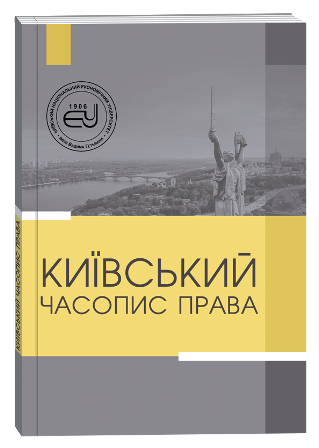INTERNATIONAL LEGAL AND ORGANIZATIONAL MECHANISMS FOR COUNTERING DISINFORMATION: A COMPARATIVE ANALYSIS OF THE PRACTICES OF UKRAINE AND THE EU
DOI:
https://doi.org/10.32782/klj/2025.2.33Keywords:
administrative liability, information security, disinformation, martial law, organizational and legal instruments, legal regime, censorship, freedom of expression, national security, counteraction actors, automated detection, content blocking, information offenses, digital regulationAbstract
Under the current conditions of hybrid warfare against Ukraine, the information front is no less significant than military operations. The aggressors systematically use methods of information warfare aimed at destabilizing Ukrainian society, undermining trust in state institutions, spreading panic, and weakening international support for Ukraine. Disinformation, as one form of informational aggression, is disseminated through controlled media, social networks, bot systems, and anonymous platforms, which significantly complicates its detection and neutralization.Martial law, introduced in accordance with Ukrainian legislation, provides a framework for the temporary restriction of certain rights and freedoms, in particular the right to access information and the freedom of expression. However, such restrictions must be carried out strictly within the limits of the Constitution of Ukraine and Ukraine’s international obligations, adhering to the principles of necessity, proportionality, and legitimacy.In this regard, there is an urgent need to define clear administrative and legal boundaries and state intervention mechanisms in the information sphere that allow for effective counteraction to disinformation without violating democratic standards.The application of organizational and legal instruments in the fight against disinformation includes a range of measures: from blocking information resources and imposing sanctions to regulating media activity and responding to the spread of false information. Nevertheless, numerous challenges arise in practice, including the lack of a unified definition of disinformation, blurred legal criteria for its identification, risks of abuse of power by executive authorities, and violations of freedom of speech. This calls for a detailed legal analysis and doctrinal understanding of the administrative and legal regime of information security during wartime.Therefore, the study of organizational and legal instruments for countering disinformation under martial law is of utmost relevance, as it helps determine the limits of permissible state intervention in the sphere of information rights, develop substantiated approaches to the legal regulation of information security, and prevent violations of fundamental human rights even during periods of crisis.
References
Конституція України від 28 червня 1996 року № 254к/96-ВР. Відомості Верховної Ради України. 1996. № 30. Ст. 141.
Про правовий режим воєнного стану: Закон України від 12 травня 2015 року № 389-VIII. Відомості Верховної Ради України. 2015. № 28. Ст. 250.
Про інформацію: Закон України від 2 жовтня 1992 року № 2657-XI. Відомості Верховної Ради України. 1992. № 48. Ст. 650.
Про національну безпеку України: Закон України від 21 червня 2018 року № 2469-VIII. Відомості Верховної Ради України. 2018. № 31. Ст. 241.
Про телебачення і радіомовлення: Закон України від 21 грудня 1993 року № 3759-XI. Відомості Верховної Ради України. 1994. № 10. Ст. 43.
Про Національну раду України з питань телебачення і радіомовлення: Закон України від 23 вересня 1997 року № 538/97-ВР. Відомості Верховної Ради України. 1997. № 48. Ст. 296.
OSCE Representative on Freedom of the Media. Joint declaration on freedom of expression and «fake news», disinformation and propaganda. 3 March 2017. URL: https://www.osce.org/files/f/ documents/6/8/302796.pdf
Wardle C., Derakhshan H. Information Disorder: Toward an interdisciplinary framework for research and policy making. 2nd edition. Strasbourg: Council of Europe, 2018. URL: https://rm.coe.int/information-disorder-report-version-august-2018/16808c9c77
EU Code of Practice on Disinformation. URL: https://digital-strategy.ec.europa.eu/en/policies/code-practice-disinformation
Khan I. Disinformation and freedom of opinion and expression: Report of the Special Rapporteur on the promotion and protection of the right to freedom of opinion and expression. 2021. UN Doc. A/HRC/47/25. URL: https://undocs.org/A/HRC/47/25
Дворовий М., Людва А. Протидія дезінформації в інтернеті: куди рухатися Україні? Грудень 2021. URL: https://www.nrada.gov.ua/wp-content/uploads/2022/02/DSLU_Disinformation_Ukraine_Report.pdf
Синиціна Ю., Федоренко С. Можливості та виклики штучного інтелекту та виявлення дезінформації: мат. VІІІ міжн. наук.-практ. конф. (м. Дніпропетровський державний університет внутрішніх справ, 15 березня 2024 року). Частина ІІ. С. 391–392.
Рудник Л.І. Поширення недостовірної інформації як засіб ведення гібридних війн. Інформація і право. 2024. № 4(51). С. 46–54.
Про протидію дезінформації. Презентація закону. URL: https://mkip.gov.ua/files/InformPolityka.pdf
Положення про Міністерство культури та стратегічних комунікацій України: затв. постановою Кабінету Міністрів України від 16 жовтня 2019 року № 885. URL: https://zakon.rada.gov.ua/laws/show/885-2019-%D0%BF#Text
Про Службу безпеки України: Закон України від 25 березня 1992 року № 2229-XII. Відомості Верховної Ради України. 1992. № 27. Ст. 382.
Про Національну поліцію: Закон України від 2 липня 2015 року № 580-VIII. Відомості Верховної Ради України. 2015. № 40. Ст. 379.
Про Державну службу спеціального зв’язку та захисту інформації України: Закон України від 23 лютого 2006 року № 3475-IV. Відомості Верховної Ради України. 2006. № 30. Ст. 258.
Порядок створення та діяльності системи оперативно-технічного управління електронними комунікаційними мережами загального користування та Національного центру оперативно-технічного управління електронними комунікаційними мережами України в умовах надзвичайної ситуації, надзвичайного або воєнного стану: затверджено постановою Кабінету Міністрів України від 24 січня 2025 року № 75. URL: https://zakon.rada.gov.ua/laws/show/75-2025-%D0%BF#n10
Кодекс України про адміністративні правопорушення: Кодекс України від 7 грудня 1984 року № 8073-X. Відомості Верховної Ради Української РСР. 1984. Додаток до № 51. Ст. 1122.
Кримінальний процесуальний кодекс України: Кодекс України від 13 квітня 2012 року № 4651-VI. Відомості Верховної Ради України. 2013. № 9–10. Ст. 88.
Про санкції: Закон України від 14 серпня 2014 року № 1644-VII. Відомості Верховної Ради України. 2014. № 40–41. Ст. 2021.








